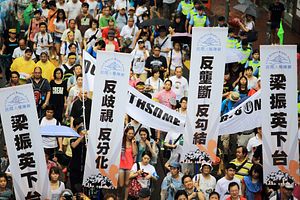As the planned “Occupy Central” protests in Hong Kong draw closer, Beijing is stepping up its attempts to exert control over the special administrative region. The protestors say they will take over Hong Kong’s Central District unless the government responds to demands for for universal suffrage in the 2017 elections of Hong Kong’s chief executive. The next phase of Occupy Central will be an unofficial referendum, held June 20-22, wherein Hongkongers will vote on proposals for electoral reform. The protests proper are slated to begin July 1.
Over the weekend, Zhou Nan, former director of the official Chinese media outlet Xinhua in Hong Kong, told Hong Kong media that the Occupy Central movement is “illegal” and “violates Hong Kong’s rule of law.” He said that the movement was a front for “anti-China forces” to try to seize control of Hong Kong. If riots or other chaos results from Occupy Central, Zhou predicted that PLA forces might intervene to take control of the situation. Speaking from the viewpoint of Beijing, Zhou said, “We could not allow Hong Kong to turn into a base to subvert China’s socialist regime under the guise of democracy.”
Proponents of Occupy Central accused Zhou of using scare tactics to thwart the movement. Occupy Central co-founder Benny Tai Yiu-ting told South China Morning Post that the movement was not subversive, but an example of civil disobedience. “Zhou only wants to scare off Hongkongers … so as to discourage people from participating,” Tai said.
Hong Kong officials were less inflammatory, but still warned against the upcoming protests. Secretary for Justice Rimsky Yuen Kwok-keung said that Hong Kong’s “police force is capable of handling any activities that would damage the law and order,” downplaying the possibility of the PLA becoming involved. However, it seems that police involvement is likely — Yuen noted that civil disobedience, by definition, “must involve a breach of law” and repeated that the government does “not wish to see any unlawful act being taken.” He urged people to rethink their participation in the movement.
Meanwhile, Beijing has given its own, more subtle response. The State Council’s Information Office issued a white paper on Tuesday explaining “the practice of the ‘one country, two systems policy’ in the Hong Kong Special Administrative Region.” The full text was posted on numerous Chinese media sites, including China Daily, People’s Daily, Global Times, and Hong Kong’s South China Morning Post. The release of the white paper was viewed as Beijing’s tacit response to the upcoming Occupy Central movement. The white paper noted “many wrong views that are currently rife in Hong Kong” about the true meaning of “one country, two systems.” In response, the report was designed to promote “a comprehensive and correct understanding and implementation of the [‘one country, two systems’] policy.”
The white paper emphasized that Hong Kong, while enjoying “a high degree of autonomy,” is still ultimately answerable to Beijing. The National People’s Congress Standing Committee “has the power of interpretation regarding the Basic Law” as well as “the power of decision on revising the selection methods of the chief executive and the Legislative Council.” In other words, Beijing reserves for itself the right to decide how Hong Kong’s elections in 2017 will be carried out, according to the NPC’s interpretation of the Basic Law. The white paper further notes that Hong Kong’s “chief executive is accountable to the Central People’s Government.”
According to the white paper, the correct view of “one country, two systems” seeks Hong Kong’s continued development and prosperity, but places the needs of China as a whole first. The objective “of maintaining China’s sovereignty, security and development interests” comes before the objective of “maintaining the long-term stability and prosperity of Hong Kong.” Likewise, ensuring Hong Kong’s “high degree of autonomy” must be subordinate to “maintaining the power of the central government” in Beijing.
While fleshing out this balance, the white paper made it very clear that Hong Kong does not possess any inherent claim to autonomy. “The high degree of autonomy of the HKSAR is not full autonomy, nor a decentralized power… The high degree of autonomy of HKSAR is subject to the level of the central leadership’s authorization,” the paper explained. The implied threat is that Beijing always has the power to simply do away with Hong Kong’s autonomy, should it feel that Hong Kong local systems are endangering China’s “fundamental system of socialism.”
Accordingly, the white paper stands firmly by Beijing’s original proclamation that “loving the country is the basic political requirement for Hong Kong’s administrators.” This idea that only Beijing-approved “patriots” can stands for office is a major issue for Occupy Central advocates, who believe this places an unacceptable restriction on Hong Kong’s democratic government. The CCP is not willing to compromise on this point. The white paper makes clear that the candidates for chief executive will be nominated by a committee, not by popular votes.
According to Reuters, Hong Kong Chief Executive Leung Chun-ying “shrugged off suggestions” that the white paper was meant as a warning from Beijing. He pointed out that the report had been in the works for over a year — but so too have the Occupy Central protests. Even if not meant as a direct reaction to Occupy Central, the white paper is obviously aimed at the sentiments behind the movement: what the report calls “confused or lopsided” interpretations of Hong Kong’s rights under “one country, two systems.”

































